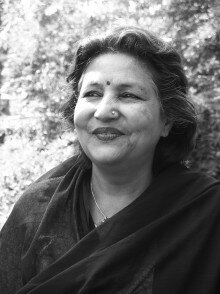
Born the youngest daughter of the Nepali dramatist, Bhim Niddhi Tiwari, Manju Kanchuli has worked as a lecturer in English and Psychology, and as a clinical therapist and conselor for trafficked women.
"Born in a house where literature, fine art and music flourished," writes Kanchuli of her life and work, "I experienced the happiness and vicissitudes of middle class family life in Kathmandu with its wants and desires amidst limited domestic resources, scarcity, lack of facilities and amenities. Still, life was beautiful and amazing. My mother, a graduate and an artist, told me, ‘When you were a child, your dad took you in his arms, pointing from the window to the horizon and asked: "What is that?" You replied, "That’s worshipping with vermilion." He said, "No. What is it?" You said, "It’s lipstick on the lips." He asked again: "No. What is it?" "It’s a rose." Your dad said to me: "This child will become a poet laureate."’
“My talent for writing poetry was nurtured by my father, writer Bhim Nidhi Tiwari, and by the literary world he lived in. Through my subsequent education and experience I gained confidence that when my pen touched the page and my heart opened, out of cascades of fragmented thought and feelings, poetry would be shaped and formed. I never wrote only with emotion. I wrote through struggle and with the awareness and expression of feelings created by the interplay of the inner and outer, bridging the real with my ideal world. I never wrote for gain or prestige. I can live without wealth and ease, but I cannot live apart from poetry. I would have died if I had to tolerate the absence of my poetry; instead I have been continually reborn. ‘For me, life is poetry. Poetry is my life.’
“As for the poems themselves – taking account of experience and disillusionment, mixing reticence with expressiveness, using image as symbol, I wrote "In the Way of a River, the Forest, Night" and "If." Expressing loneliness, resignation and longing, revitalized by the writing and a refusal to submit, knowing that through poetry the mundane becomes fine art and disappointment is overcome, I wrote ‘Days in the Life’ and ‘Hunger for Justice and the Water of Desperation.’ Aware that the essence of all that is valuable in culture, in personal, social and public life has disappeared like the images from Kathmandu’s temples, while people continue to worship, superficially and for show, in the name of those deities or traditional values, I wrote ‘A Strange Temple.’
“Throughout my life I have exerted myself and dedicated my art to writing poetry and short stories in Nepali, and in English as well, following my own intuitive sense and reading aloud in public with an ongoing hope for change in the country and in individuals.”
Bibliography
Poetry
Kiranka Chhalharu (Waves of Sunrays), International Women’s Year Committee, Nepal, Kathmandu, 1995
Mero Jiban Mero Jagat (My Life My Universe), Nepal Royal Academy, Kathmandu, 1997
Palak Vitra Palak Bahira (Inside and Outside Eyelids), Sajha Publication, Kathmandu, 2000
Atmapratiti (Self-Reflection), Bagara Foundation Nepal, Kathmandu, 2001
Fiction
Kehi Maya Kehi Paridhi (Some Love Some Limitation), Sajha Publication, Kathmandu, 1989
Manju Kanchulika Katha (Stories by Manju Kanchuli), Sajha Publication, Kathmandu, 1997
Bishwamitrako Shuhag Raat (Bishwamitra’s Honeymoon Night), Nepal Academy, Kathmandu, 2005
Benamka Manisharu (Men With No Identity), Sajha Publication, Kathmandu, 2008
Bhatko Sapana (A Wish for Rice), Sajha Publication, Kathmandu, 2013
In Translation
Two Sisters: The Poems of Benju Sharma and Manju Kanchuli, Book Faith India, Delhi, 1998
Days in the Life, translations from Nepali and Nepal Bhasa, The Printhouse, Kathmandu, 2011

